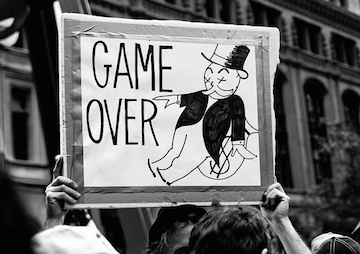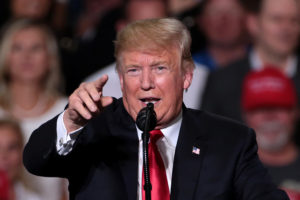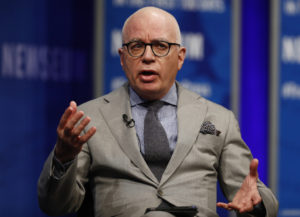Are Think Tanks as Independent as We Think?
Some of the world’s most respected think tanks are swayed by corporate interests, The New York Times reports, and researchers working within the groups often have conflicts of interest. The Occupy Wall Street protests of 2011 opposed the influence of corporate money. (Shehan Peruma / CC 2.0)
The Occupy Wall Street protests of 2011 opposed the influence of corporate money. (Shehan Peruma / CC 2.0)
The Occupy Wall Street protests of 2011 opposed the influence of corporate money. (Shehan Peruma / CC 2.0)
Are think tanks “blurring the line between researchers and lobbyists”? Eric Lipton and Brooke Williams of The New York Times certainly think so. In a long report published Sunday, Lipton and Williams come to the conclusion that some of the world’s most renowned think tanks “have frequently become vehicles for corporate influence and branding campaigns.”
Think tanks, many of which are nonprofit organizations, are research institutions that study policy and are generally viewed as financially independent. The Brookings Institution, one of the most acclaimed think tanks in the country, is the main target of The New York Times piece. Lipton and Williams, in partnership with the New England Center for Investigative Reporting, cite internal memos and emails to build their case against Brookings’ Metropolitan Policy Program, which studies policy initiatives related to the economy. Lipton and Williams write:
The likely conclusions of some think tank reports, documents show, are discussed with donors — or even potential ones — before the research is complete. Drafts of the studies have been shared with donors whose opinions have then helped shape final reports. Donors have outlined how the resulting scholarship will be used as part of broader lobbying efforts. The think tanks also help donors promote their corporate brands, as Brookings does with JPMorgan Chase, whose $15.5 million contribution is the largest by a private corporation in the institution’s history.
Despite these benefits, corporations can write off the donations as charitable contributions. Some tax experts say these arrangements may amount to improper subsidies by taxpayers if think tanks are providing specific services.
Specifically, the authors cite a Brookings spreadsheet that they claim “highlighted Brookings’s practice of assuring that donors would see results from their contributions.” This, Lipton and Williams argue, brings up questions regarding Brookings’ nonprofit status. “Donations from the corporations to Brookings are tax exempt based on the premise that the think tank’s work benefits the public good, not a company’s bottom line,” they write, before citing two nonprofit lawyers who believe Brookings’ arrangements “raised questions.”
Brookings posted a public response on Medium, stating that the piece “fundamentally misrepresents our mission and distorts how we operate, particularly in our relationship with corporate funders.” It continues:
The reporters’ attempt to buttress their thesis with cherry-picked phrases lifted from thousands of pages of internal — often informal or draft — documents, using them out of context. They also ignore a large body of evidence we made available to them demonstrating that the projects in question were developed in ways that hewed to our institutional standards of scholarly independence.
Brookings responds in several points to Lipton and Williams’ critique of the Metropolitan Policy Program. “In the coming days,” the statement concludes, “we will provide point-by-point rebuttals of the reporters’ allegations made in these articles.”
Lipton and Williams’ report includes assertions against many other think tanks as well, such as the Atlantic Council, the Center for Strategic and International Studies, and the Hudson Institute.
The Hudson Insitute also issued a statement in response to the assertions against it, clarifying “two key matters about its own work that the Times has either obscured or misstated.” It also notes that it has a four-star rating from Transparify, which gives global ratings to “the financial transparency of major think tanks.” The Brookings Institution also received four stars, a “broadly transparent” rating.
Sunday’s report by Lipton and Williams was the first in a series called “Think Tanks Inc.” Part two in the series was published Monday. Co-written by Lipton, Williams and Nicholas Confessore, the second article questions the objectivity of researchers within think tanks.
“An examination of 75 think tanks found an array of researchers who had simultaneously worked as registered lobbyists, members of corporate boards or outside consultants in litigation and regulatory disputes, with only intermittent disclosure of their dual roles,” the piece states. “Many think tanks also readily confer ‘nonresident scholar’ status on lobbyists, former government officials and others who earn their primary living working for private clients, with few restrictions on such outside work.”
Lipton, Williams and Confessore have criticized think tanks, particularly Brookings, before. In a 2014 Times article, they wrote that many think tanks accept huge donations from foreign governments, giving these foreign interests more lobbying power in Washington.
Read the entire piece on corporate influence on think tanks here, and the piece on think tank researchers here.
—Posted by Emma Niles
Your support matters…Independent journalism is under threat and overshadowed by heavily funded mainstream media.
You can help level the playing field. Become a member.
Your tax-deductible contribution keeps us digging beneath the headlines to give you thought-provoking, investigative reporting and analysis that unearths what's really happening- without compromise.
Give today to support our courageous, independent journalists.




You need to be a supporter to comment.
There are currently no responses to this article.
Be the first to respond.